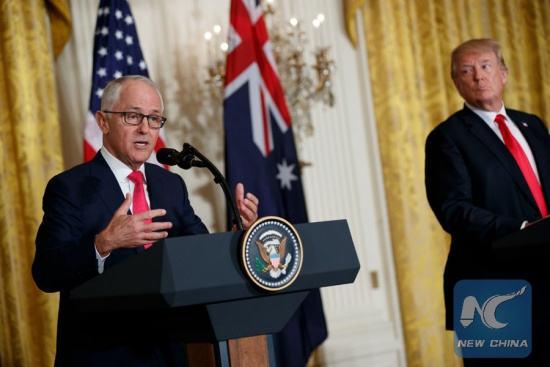
Australian PrimeMinister Malcolm Turnbull (L) speaks during a joint press conference with U.S. President Donald Trump at the White House in Washington D.C., the United States, Feb. 23, 2018. (Xinhua/Ting Shen)
Australian Prime Minister Malcolm Turnbull wrapped up a four-day visit to the United States on Saturday after failing to woo U.S. President Donald Trump back to the Trans-Pacific Partnership (TPP) negotiations.
According to a list offered by the White House after Friday's Trump-Turnbull meeting, the two nations announced a commitment to further cooperation on areas such as energy, infrastructural construction, health security and anti-terrorism.
Despite a wide range of consensus reached in Turnbull's visit, it is believed one of the biggest challenges in his visit to Washington was to persuade the U.S. president to soften his stance on the TPP, a trade pact Trump tore up last year.
The Australian prime minister offered to invest Australian pension money into U.S. infrastructure to make U.S. rejoin the group while Trump was not nudged.
The TPP "was a very bad deal for the United States. It would have cost us tremendous amounts of jobs, would have been bad," Trump said in the joint press conference with Turnbull.
"Mateship" was the word intentionally picked by Trump and Turnbull to term the bilateral relations with a rocky start featuring Trump's abrupt ending of his phone call with Turnbull in Jan. 2017 over their clash on an asylum receiving agreement, and Turnbull's parody imitation of Trump's way of speaking and his link with the Russian government in June.
That word, however, did not make Trump greenlight the U.S. re-entry into the negotiations of the TPP.
"I like bilateral deals much more than multilateral. I like to be able to negotiate with one country, and if it doesn't work out, you terminate ...When you get into multi, you can't do that," Trump added.
"The U.S. no longer is pursuing TPP so that framework is dead as far as America is concerned," said Brookings Institution Senior Fellow Darrell West.
West added that the two countries have differences of opinion on immigration policy, climate change, and trade issues. "This is surprising because historically the two nations have been very close and worked well together."
Negative buzz against China has become more frequent than ever recently both in the United States and Australia.
At the joint press conference when two Turnbull-picked Australian journalists asked Trump his opinion of China's rising regional influence, they received unexpected answers.
"We have developed a great relationship with China; probably closer than we've ever had," said the White House host.
For his part, Turnbull said the China-U.S. ties are "the most -- single most important relationship" and "clearly very respectful, very frank, very clear-eyed."
"For our own part, we see China's rise as being overwhelmingly a positive for the region and for the world," the Australian leader also said.


















































